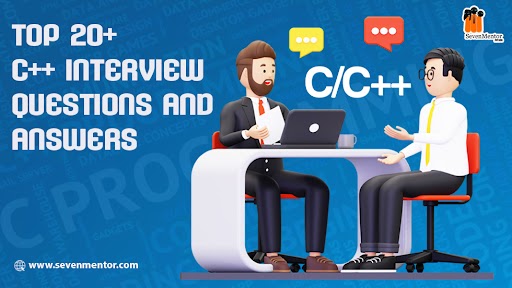Top 20 C++ Interview Questions and Answers
Prepare for your C++ interviews with confidence! Explore the C++ interview questions and answers to ace your next technical interview.
1. What is C++?
Answer: C++ is a general-purpose programming language that is an extension of the C programming language. It supports object-oriented programming, generic programming, and procedural programming paradigms.
2. What is the difference between C and C++?
Answer: C++ is an extension of C with additional features like classes, objects, inheritance, polymorphism, and templates, which are not available in C. Additionally, C++ supports function overloading and namespaces, which are not present in C.
3. Differentiate between stack and heap memory.
Answer: Stack memory is used for static memory allocation, while heap memory is used for dynamic memory allocation. Stack memory is faster but limited in size, whereas heap memory is slower but has a larger size.
4. What is a class and an object in C++?
Answer: A class is a template used for creating objects. It defines attributes (data members) and behaviors (member functions) that the objects of the class will have. An object is an instance of a class.
5. What is a constructor?
Answer: A constructor is a method of a class that is automatically called when an object of that class is created. It is used to initialize the object’s data members. Class name and method name are the same in a constructor.
6. What is inheritance?
Answer: Inheritance is a mechanism in C++ by which a class can inherit properties and behaviors from another class. The class that inherits is called the derived class, and the class from which it inherits is called the base class.
7. What is polymorphism?
Answer: Polymorphism is the ability of a function or operator to behave differently based on the object that it is operating on. It can be achieved in C++ through function overloading, function overriding, and using virtual functions.
8. What is encapsulation?
Answer: Encapsulation is the bundling of data (attributes) and functions (methods) that operate on the data into a single unit (class). It helps in hiding the internal implementation details of a class from the outside world.
9. What is a pointer?
Answer: A pointer is a variable that stores the memory address of another variable. It allows dynamic memory allocation and manipulation of memory locations.
For Free, Demo classes Call: 8237077325
Registration Link: C and C++ Classes in Pune!
10. Differentiate between passing parameters by value and passing parameters by reference.
Answer: In pass-by-value, a copy of the actual parameter is passed to the function, while in pass-by-reference, the address of the actual parameter is passed to the function, allowing the function to modify the actual parameter.
Intermediate Level:
11. What is function overloading?
Answer: Function overloading is a feature of C++ that allows a function to have multiple definitions with the same name but different parameter lists.
12. What is operator overloading?
Answer: Operator overloading is a feature of C++ that allows operators to be redefined to work with user-defined data types in C++.
13. What is a virtual function?
Answer: A virtual function is a member function of a class that is declared with the virtual keyword and is intended to be overridden in derived classes.
14. What is the Standard Template Library (STL)?
Answer: The Standard Template Library (STL) is a collection of generic data structures (containers) and algorithms provided by C++ to facilitate programming. It includes containers like vectors, lists, maps, and algorithms like sorting, searching, etc.
15. What are iterators in C++?
Answer: Iterators are objects that allow the traversal of elements in a container. They provide a way to access the elements of a container sequentially.
16. What is a smart pointer?
Answer: Smart pointers are objects that behave like pointers but provide automatic memory management. They automatically release the memory they own when they are no longer needed.
Advanced Level:
17. What is move semantics?
Answer: Move semantics is a feature introduced in C++11 that enables the efficient transfer of resources (such as dynamically allocated memory) from one object to another without unnecessary copying.
18. What are lambda expressions?
Answer: Lambda expressions are anonymous functions introduced in C++11 that can be used to define inline functions. They are often used in conjunction with standard algorithms and functions.
19. What is exception handling?
Answer: Exception handling is a mechanism in C++ that allows the detection and handling of errors or exceptional situations during program execution. It involves throwing exceptions when errors occur and catching and handling them at appropriate places in the code.
20. What is the difference between std::vector and std::list in STL?
Answer: std::vector is a dynamic array that provides fast random access to elements but slower insertion and deletion in the middle. std::list is a doubly linked list that provides fast insertion and deletion at any position but slower random access.
21. What is SFINAE (Substitution Failure Is Not An Error)?
Answer: SFINAE is a principle in C++ template metaprogramming where compiler errors resulting from substituting template arguments are not considered errors. Instead, they result in the compiler trying alternative template instantiations.
Do visit our channel to explore more: Click Here
Author:-
Sarika Ganesh Kore
Call the Trainer and Book your free demo Class For C Programming Call now!!!
| SevenMentor Pvt Ltd.
© Copyright 2021 | SevenMentor Pvt Ltd.

